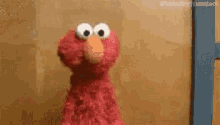Is Elmo Black?
I brought this up a little while ago and I thought at the time it’d be a simple enough question. I wanted to make sure before I went in on it, though, that I knew whether or not I was dealing with something obvious to people who weren’t as far as I am as outside of American Blackness.
It reads a bit like a trick question, I think. Elmo after all, is not a black person, he is a muppet. Not only is he not human, he’s not an African-American, and if nothing else, he’s red.
Why then, would I ask if Elmo is black?

First, Elmo is a character who is performed. Elmo is not someone you inherently perform when you get the Elmo puppet; look at all the many lovable scamps making hilarious jokes about Muppets saying dirty words when they get their hands on an elmo toy. There’s a style guide to Elmo; he has a vocabulary and a characterisation, and those things are built on what the character’s already done, the image he projects to the audience. Those details are made up of a history of Elmo performances, which are themselves informed by the people who have creative control over what Elmo ‘should’ have and do, starting with Elmo’s creator, the first person to make an Elmo, and define the character as he should work.
That creator, Kevin Clash (who is it seems probably a bad dude, alas, but this is not the venue for that conversation), is a black man. He defined Elmo’s voice, and vocabulary, and mannerism, and also puppeteered him for decades, too – which means that Elmo’s manner and behaviour was all being defined by someone who lived and experienced blackness. Even though right now, Ryan Dillon is Elmo’s primary puppeteer, and Ryan Dillon isn’t a black man, the upshot is that Ryan Dillon, performing Elmo is going to perform some of what Kevin Clash performed.
In this way, the question becomes: Does Elmo inherit blackness from Kevin Clash? Does he do or relate to the world the way that a black kid might, especially in the context of a life that isn’t tainted by the way our world oppresses black kids? To what extent does the blackness Kevin Clash put into Elmo’s performance still persist as Ryan Dillon attempts to continue playing that character faithfully?
Elmo is a performance; Elmo is a character defined and created by a black man; does that black man’s performance bring with it blackness?
This is why I asked the question.
I don’t have an answer, by the way. The answer as best can be understood is if black people, other people who know how it is and what it means, to perform blackness, can look at Elmo and intuitively grasp that he’s ‘meant’ to be black, or that he’s a participant in their experience.